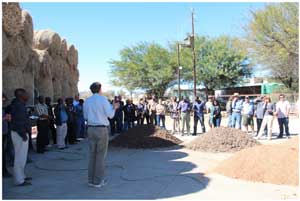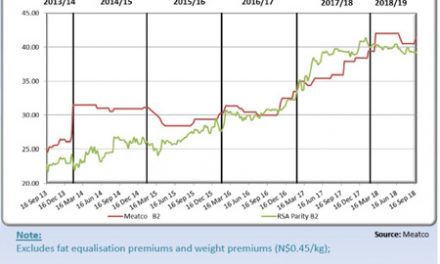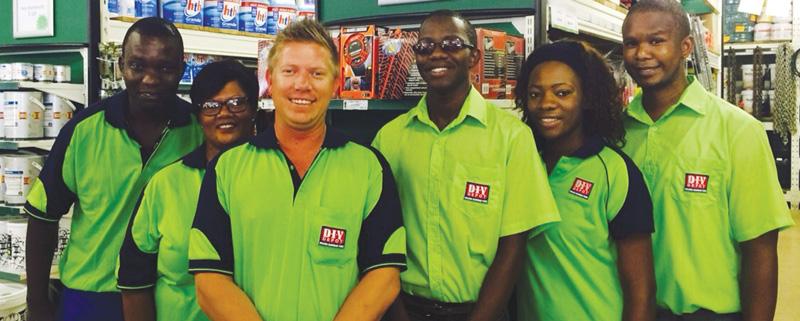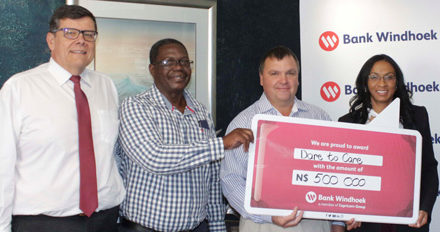
Organics for larger acres
Mr Tobias Bandel demonstrates compost making to large scale commercial producers at the Sustainable, Ecological Crop and Horticulture Conference in OkahandjaA bevy or international experts imparted their knowledge of organic agriculture to a keen audience at a conference in Okahandja early in August. The same experts addressed a similar conference in Rundu, a week later. Both conferences were organised by the Namibian Organic Association under the banner “Sustainable, Ecological Crop and Horticulture Conference for Namibian producers.”
The Okahandja conference was for large scale producers, while the conference in Rundu was developed specifically for small-scale producers. The focus at both conferences was building resilient farms by concentrating on sustainable methods of building up soil quality for improved crop yields.
“Organic Agriculture makes farms and people more resilient to climate change, mainly due to its water efficiency, resilience to extreme weather events and lower risk of complete crop failure. It builds up soil instead of fostering land degradation and contributes to global food security,” said Manjo Smith, Chairperson of the Namibian Organic Association. “In dry climates this is important because it means that we don’t need to irrigate too frequently but can still be productive, and are therefore also less vulnerable if the rainfall is not sufficient. Also, the soil helps to sequester carbon from the atmosphere, and micro-organisms in a living soil will help with pest and disease control.” An organic farmer in Okahandja, Smith is the driver behind the conferences and serves as a World Board Member on the International Federation of Organic and Agriculture Movements (IFOAM). This particular portfolio gave her access to some of the world’s leading experts in sustainable, ecological and organic agriculture and soil health.
Delegates to the Okahandja conference had the privilege of hearing Mr Volkert Engelsman, founder and CEO of Eosta in Holland, advocate of organic and sustainable farming practice and leading distributor of organic fresh produce in Europe. Speaking from a marketer and consumer perspective, Engelsman emphasised the continued and consistent demand for organic products in Europe.
“There is no sustainability if there is no transparency”, says Engelman, whose organisation has developed a highly effective “Nature & More” campaign to encourage European consumers to go online, through a producers barcode and point of purchase, check where the product comes from, the details of the growers and familiarise themselves with the details of their farm.
Small-scale producers in the Okavango learned about making compost and its application in farming. They also heard from conservation agriculture specialist, Mr Max Simfukwe. “Namibia is the driest country in sub Saharan Africa and we practice unsustainable farming practices at small scale,” he told delegates. “If we carry on farming this way, we will leave a legacy of sandy and infertile soils,” he said. He defined conservation farming as a number of practices that when combined, conserves soil, moisture, inputs, energy, time and money and showed delegates some highly improved farming methods that include new plating techniques and crop rotation. Many small-scale farmers still practice destructive and unsustainable farming methods such as residue burning and ploughing.
The Rundu delegates were also given presentations on the importance of record keeping of planting, crop rotation, yields per hectare, cost of production as well as the consistent supply of fresh produce to traders. Mr Patrick Hilger, farming mentor in the Kavango Region and Mrs Elaine Smith of the Farmer Support Programme attached to the AgriBank both felt that exposing small scale farmers to sustainable farming practice was a positive move. Elaine Smith commented, “Overall, the conference was very interesting and I think judging by the high delegate turnout, there is a huge interest in the topic of sustainable horticulture practice.
This effort was supported by the Namibian Agronomic Board and The Ministry of Agriculture, Water and Forestry.












































